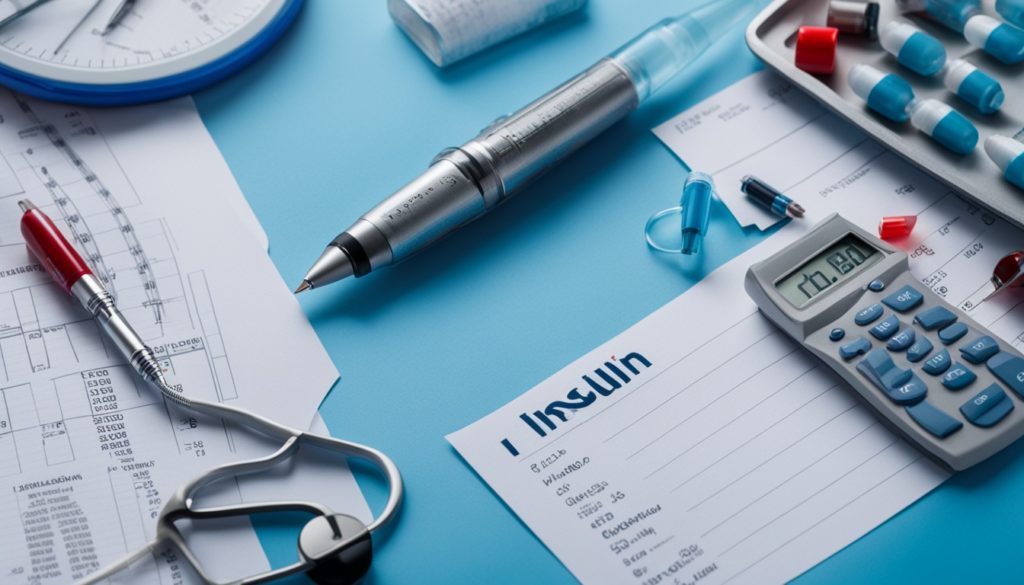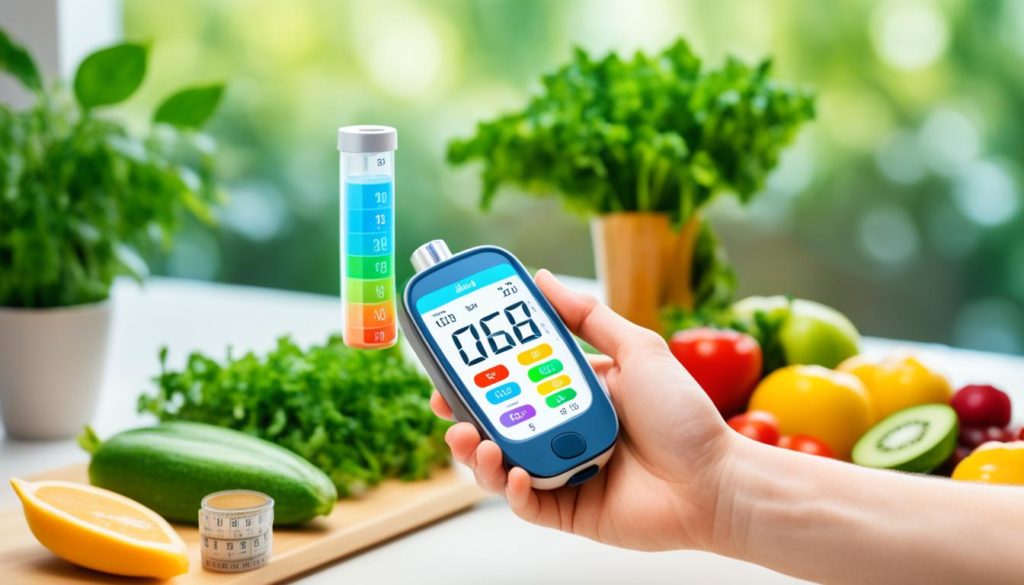Did you know over 34 million Americans have diabetes? Yet nearly one in four don’t know they have it. Whether you’re newly diagnosed or have been managing diabetes for years, managing it well is key. Asking your doctor the right insulin questions can greatly improve your health.
Understanding things like blood sugar checks, insulin amounts, and lifestyle changes is important. These talks with your doctor help create a plan that fits you. They cover everything from regular visits to changing your diet and exercise habits.
Key Takeaways
- Engage actively with your doctor for better diabetes management.
- Understand the importance of blood sugar monitoring and insulin dosage.
- Discuss lifestyle adjustments, including diet and exercise, with your GP.
- Regular consultations can help in maintaining effective diabetes management.
- Awareness and action are crucial to prevent long-term complications.
Talking about these insulin questions with your doctor is a big step forward. It helps you manage your diabetes better and live a fuller life.
Understanding Your Insulin Therapy
Understanding your insulin therapy is key to managing diabetes well. There are many types of insulin, and knowing about yours is crucial. This includes how it works and how it’s different from others. Knowing this can help you fit your treatment into your daily life and meals.

What type of insulin am I being prescribed?
One important question is what type of insulin you are getting. There are rapid-acting, long-acting, and combination insulins for Type 1 diabetes and Type 2 diabetes. Rapid-acting insulin helps quickly with blood sugar spikes. Long-acting insulin helps control blood sugar all day. Knowing about your insulin helps you manage your diabetes better.
What are the differences between these insulins?
It’s also important to know how different insulins…well, differ. The table below shows things like when they start working, when they work the best, and how long they last for each type.
| Type of Insulin | Onset | Peak Time | Duration |
|---|---|---|---|
| Rapid-Acting | 15 minutes | 1-2 hours | 2-4 hours |
| Short-Acting | 30 minutes | 2-3 hours | 3-6 hours |
| Intermediate-Acting | 2-4 hours | 4-12 hours | 12-18 hours |
| Long-Acting | Several hours | No peak | 24 hours or more |
How does the prescribed insulin work within my body?
Another big question is how your insulin works in your body. For those managing Type 1 diabetes or Type 2 diabetes, understanding how insulin works can help you control blood sugar. Rapid-acting insulin deals with sugar spikes after eating. Long-acting insulin keeps sugar levels stable all day. This balance lets you adjust your insulin therapy to fit your life.
Monitoring Blood Sugar Levels
Monitoring blood sugar is key to managing diabetes, especially with insulin treatment. By keeping track regularly, you can hit your blood sugar goals. This helps avoid low and high sugar symptoms. Talking to your GP about a custom monitoring plan improves control over diabetes.
How often should I check my blood sugar levels?
The need to check your blood sugar changes based on your health and treatment. Those with type 1 diabetes might check their levels several times daily. People with type 2 diabetes might do it less often. Getting advice from your healthcare provider is vital to know how often you should check.

What are the target ranges for my blood sugar levels?
Your blood sugar goals depend on your age, health, and diabetes type. The aim is to prevent lows and highs and keep sugar levels stable. Talk to your doctor to set targets that are good for you.
What should I do if my levels are too high or too low?
Having a plan for managing your blood sugar is crucial. For high levels, you might need to adjust your insulin, exercise more, or change your diet. For low levels, quick-action carbs or glucose tablets can help. Always work with your doctor to create a solid plan.
Insulin Dosage Guidance
Managing your insulin right is key in a Diabetes treatment plan. The right insulin dosage guidance keeps your blood sugar stable. This avoids too low or too high sugar levels. Learning about your prescription and knowing what changes your insulin needs is crucial for good health.
How should I determine the correct dosage of insulin?
Everyone needs a different amount of insulin. Talk to your doctor to get a Diabetes treatment plan made just for you. This plan will look at your diet, how active you are, and your sugar levels. It’s important to keep in touch with your doctor. This makes sure your plan fits any new changes in your life.
What factors can impact my insulin dosage?
Many things can change how much insulin you need. It’s important to keep checking on these:
- Dietary Patterns: Eating meals with different amounts of carbs.
- Physical Activity: How much or how often you exercise changes.
- Current Health Status: Getting sick or feeling stressed for a long time.
- Other Medications: Other medicines that might affect your insulin or sugar levels.
When and how should I adjust my insulin dosage?
Sometimes, you need to change how much insulin you take. This could be because you ate differently, moved more or less, or anything else new happened. Always check your sugar levels and talk to your doctor about these numbers. Here are some tips for adjusting insulin dosage:
| Situation | Possible Adjustment |
|---|---|
| Increased Physical Activity | Potentially lower your insulin dose |
| High-Carbohydrate Meals | Adjust dosage to counter spikes |
| Illness or Infection | Might require a higher dose |
| Reduced Physical Activity | Potential need for a higher dose |
Always talk to your healthcare provider before making changes. The right insulin dosage guidance keeps your sugar levels in check. This helps make your Diabetes treatment plan work best for you. Being informed and active in managing your diabetes lets you make smart decisions about your insulin.
Insulin Injections and Administration
Proper technique in insulin injection is key. It helps insulin absorb better and controls blood sugar well. Patients often have many questions about it. Following the best methods is crucial, and talking to your GP helps a lot.
What are the best practices for administering insulin?
To administer insulin correctly, staying consistent and mastering the technique are vital. Here’s what you need to know:
- Always check the insulin type and expiry date before use.
- Make sure the injection site is clean to avoid infections.
- Change up the injection spots to prevent lipodystrophy.
- Inject insulin into the fatty layer under the skin for it to work best.
Are there any specific injection sites I should use or avoid?
Where you inject insulin makes a big difference in how well it works. You can use your belly, thighs, butt, or upper arms. Here are some tips:
- The belly is the best spot for quick absorption.
- Stay away from injured or irritated skin.
- Keep changing spots but stick to the same general area to avoid harming your tissue.
How can I properly dispose of used insulin needles?
Safe disposal of insulin needles is key for avoiding injury and keeping a clean space. Follow these steps:
- Put used needles in a sharps container.
- Never throw needles in the trash.
- Find out where to get rid of sharps containers in your area.
By sticking to these practices, you make sure insulin is given safely. Plus, you answer common questions about insulin shots. Safe needle disposal also helps keep everyone’s environment safe.
Potential Side Effects and Risks
Insulin therapy is vital for controlling blood sugar but has side effects. It’s critical to have an Insulin side effects discussion with your doctor. This helps fully understand the possible risks. Hypoglycemia, or low blood sugar, is a big worry for patients.
Aside from low blood sugar, gaining weight and changes in body salts are common. Knowing how your body reacts to insulin helps manage these issues. You must check your blood sugar often and adjust your diet as needed.
Reactions at the insulin injection site are also concerns. Learning the best ways to inject insulin can lower these risks. Still, talking to your doctor about them is crucial for proper care.
Dealing with insulin’s complexities means patients need to be active in their care. This includes knowing about different insulin types and changing treatment based on results. Regular talks with your healthcare provider are key in handling insulin therapy complications.
| Side Effect | Description | Mitigation |
|---|---|---|
| Hypoglycemia | Low blood sugar levels causing dizziness, confusion, and sometimes unconsciousness. | Monitor blood glucose levels, consume glucose tablets. |
| Weight Gain | Increased body weight as a result of insulin therapy. | Regular exercise, healthy diet, and consistent monitoring. |
| Injection Site Reactions | Localized reactions such as redness, swelling, and pain at the injection site. | Rotate injection sites, proper injection techniques. |
Managing Your Insulin During Exercise
Exercise is key for managing diabetes. It demands careful insulin adjustment. Getting how physical activity changes your insulin needs is vital for good blood sugar control.
Should I adjust my insulin before exercising?
Before exercising, changing your insulin can prevent low blood sugar. It’s important to talk with your GP about lowering your insulin doses before workouts. Usually, you might need to cut back on short-acting or rapid-acting insulin. Some might also need to tweak their long-lasting insulin.
How can physical activity affect my insulin needs?
Exercise can change how much insulin you need. This depends on how hard and long you work out. High-intensity exercises might mean you need to check and adjust more often. Lighter activities may only need small tweaks. Knowing how your body reacts to exercise afterwards is also key. Talk often with your GP and keep an eye on things to manage your insulin well.
| Exercise Type | Insulin Adjustment | Additional Tips |
|---|---|---|
| Light (Walking, Yoga) | Minor reduction | Monitor levels during and after exercise |
| Moderate (Cycling, Jogging) | Moderate reduction | Carry fast-acting glucose |
| High-Intensity (Running, HIIT) | Significant reduction or pump adjustment | Ensure pre- and post-exercise nutrition |
Diet and Insulin Therapy
Insulin therapy and diet are closely connected. It’s essential for patients to know how food affects their insulin requirements. Certain foods can raise blood sugar levels, making diabetes hard to manage. Learning about these foods allows patients to create meals that meet diabetes nutrition guidelines.
What foods should I avoid while on insulin therapy?
To manage your blood sugar, steer clear of high-glycemic index foods. This includes sugary treats, white bread, and processed items. These foods can cause quick blood sugar spikes, needing more insulin.
Instead, choose foods with a low-glycemic index. Good choices are whole grains, legumes, and non-starchy veggies. Eating these helps keep your blood sugar steady and assists in insulin management.
How does my diet affect my insulin requirements?
Your diet has a big impact on your insulin needs. Eating foods high in fiber, lean proteins, and healthy fats helps keep blood sugar levels even. It’s important to watch how many carbs you eat because they directly impact how much insulin you need. A healthy diet supports your insulin therapy, leading to better diabetes nutrition and health.
Combining these dietary tips with your insulin therapy can greatly improve your glucose control. It can also lessen the chance of becoming insulin resistant. Always paying attention to your diet is crucial for effective insulin management and your overall health.
Frequently Asked Insulin Questions for Doctor
Talking about insulin therapy with your doctor is key. It’s vital to ask insulin treatment queries for good diabetes control. Knowing how to use insulin right can ease worries.
Getting ready with a list of diabetes management questions boosts your confidence. Questions can vary from when to take medicine to dealing with insulin fears. These talks help you fully understand your treatment.
Asking both general and detailed questions improves your care. Here’s a guide to key questions you may have:
| Question | Reason for Inquiry |
|---|---|
| What type of insulin do I need? | Understand the types of insulin and their effects on your body. |
| How do I inject insulin properly? | Learn the best practices for insulin injection to avoid errors. |
| What should I do if I miss a dose? | Gain guidance on managing missed doses to prevent complications. |
| Can I reuse insulin syringes? | Ensure safe practices and avoid infection risks. |
| How should I store my insulin? | Maintain insulin efficacy through proper storage techniques. |
Discussing insulin treatment queries with your doctor is crucial. A well-thought-out list of questions promotes active involvement. This leads to better treatment results.
Conclusion
We’ve explored the complex world of insulin therapy and diabetes management together. Learning about insulin prescriptions and how to use them is key. It’s important to talk with your healthcare team to make a plan that works for you.
Keeping an eye on your blood sugar and adjusting insulin as needed is vital. Your diet and exercise also play a big part. Knowing about side effects is essential. Being involved in your care helps ensure you get the best results.
Knowing the right questions to ask makes you a key player in your diabetes care. This helps you manage your health better and supports good diabetes care. Continuous learning and teamwork with your healthcare providers are crucial for success.
FAQ
What type of insulin am I being prescribed?
Your doctor will choose the right insulin for you, based on your needs. It may be rapid-acting, long-acting, or both. These types match your blood sugar goals.
What are the differences between these insulins?
Each insulin has its timing. Rapid-acting insulin works fast for meal times. Long-acting insulin keeps your sugar level steady all day or night.
How does the prescribed insulin work within my body?
Insulin lowers your blood sugar by helping cells take in glucose or by cutting down glucose made by the liver. Knowing how your insulin works helps you control your sugar better.
How often should I check my blood sugar levels?
How much you check your blood sugar depends on your diabetes type and health plan. Talk to your GP about what’s best for you.
What are the target ranges for my blood sugar levels?
Your GP will set blood sugar targets for you, considering things like age and health. These targets are key for managing your diabetes well.
What should I do if my levels are too high or too low?
If your sugar is too high or low, you need a plan. Your GP will guide you on what to do right away.
How should I determine the correct dosage of insulin?
Finding the right insulin dose depends on your meals, activity, and sugar levels. Your GP will help find the best dose for your daily life.
What factors can impact my insulin dosage?
Many things can change how much insulin you need, like diet or stress. Talk about these with your GP to adjust your dose as needed.
When and how should I adjust my insulin dosage?
Your GP will show you how to change your insulin for daily needs or special times. Being flexible with your dose is crucial for good diabetes control.
What are the best practices for administering insulin?
Injecting insulin right, including changing the spot each time, is important. Your GP will teach you the proper way to take your insulin safely.
Are there any specific injection sites I should use or avoid?
You should inject insulin into fat areas like your belly, thigh, or arm. Changing spots avoids skin problems. Your GP will give you tips on rotation.
How can I properly dispose of used insulin needles?
Throw away used needles in a sharps container to avoid accidents. Your GP will tell you how to do it safely for everyone’s safety.
Should I adjust my insulin before exercising?
Working out changes your sugar levels, so you might need to tweak your insulin. Your GP will help you balance insulin with exercise.
How can physical activity affect my insulin needs?
Exercise lowers your sugar, possibly needing less insulin. Your GP can guide you on adjusting insulin for different activities.
What foods should I avoid while on insulin therapy?
Some foods can raise your sugar quickly, which isn’t great when on insulin. Your GP will advise you on what foods to skip to keep your sugar steady.
How does my diet affect my insulin requirements?
What you eat impacts how much insulin you need. Balancing food types and knowing their effects helps you manage better. Your GP will guide you through nutrition.


